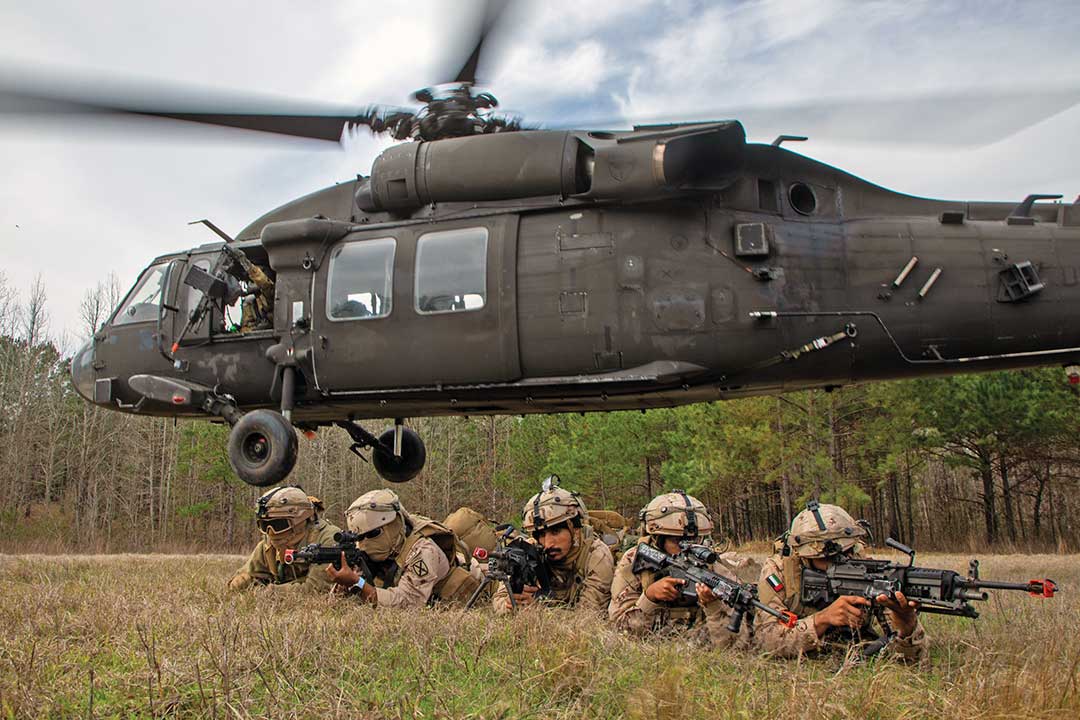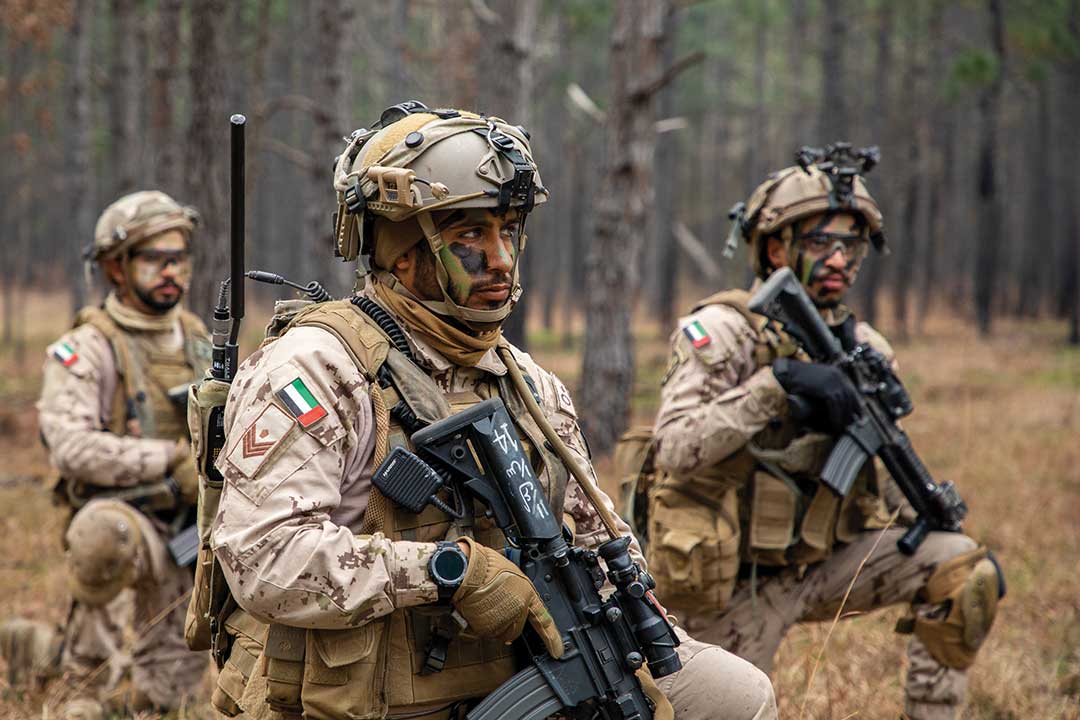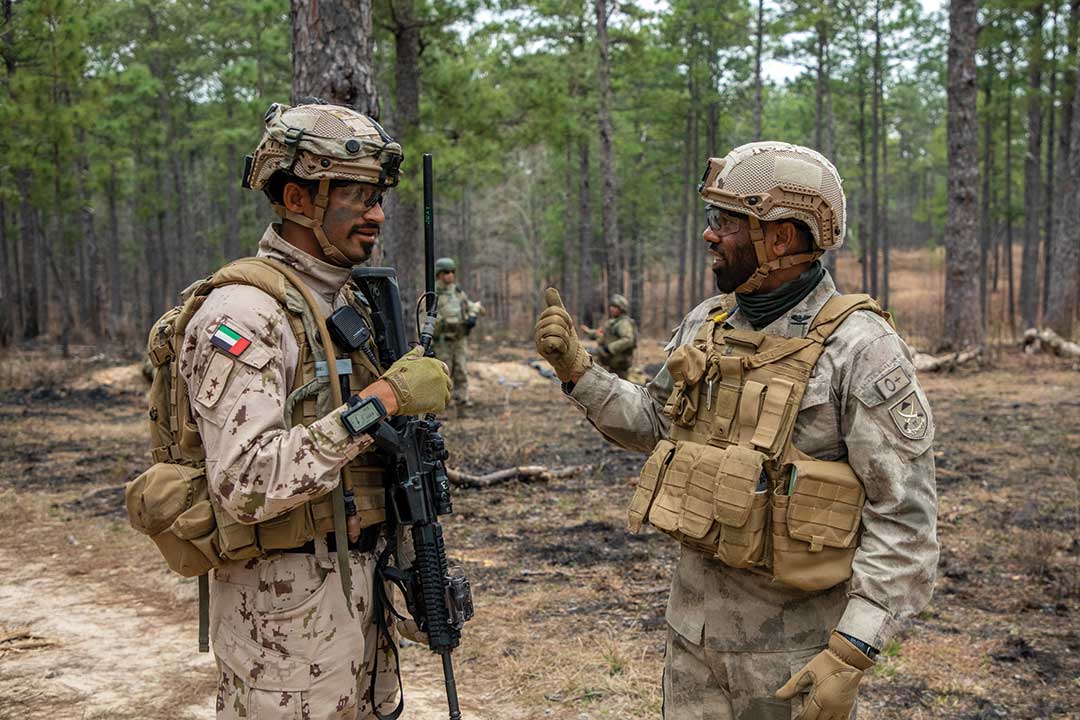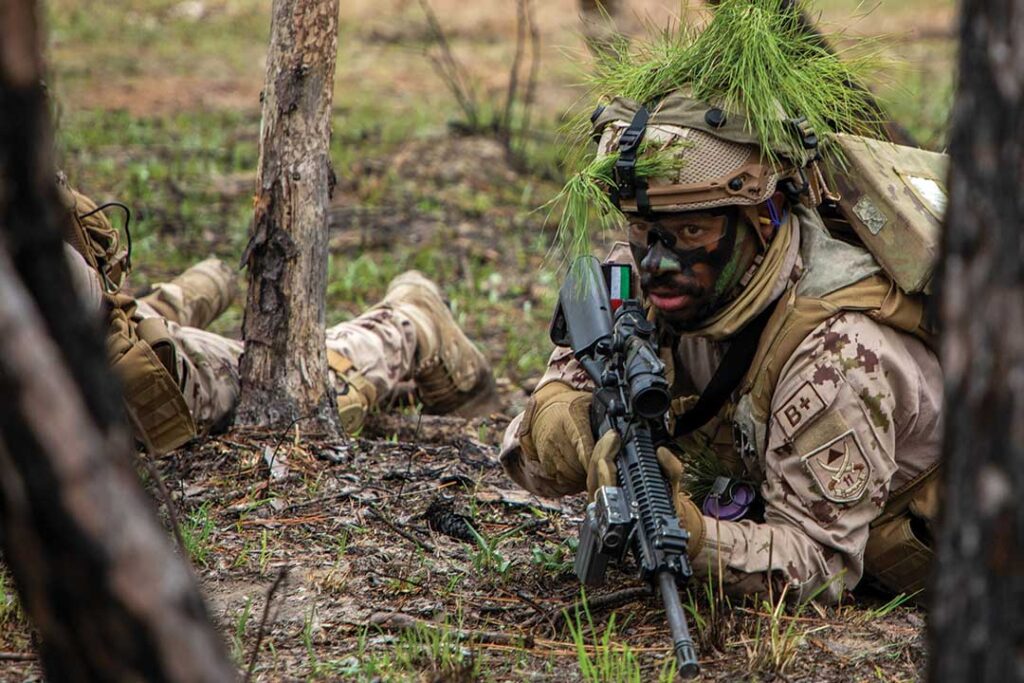Unipath Staff. Photos by MAJ. JASON WELCH/U.S. ARMY CENTRAL
“Yalla, yalla!” The cry goes out to the team of U.S. and United Arab Emirates combat engineers. “Let’s go!”
Gunfire rips through the forest. Automatic weapons fire suppresses enemy fighters. The engineers confront a string of concertina wire blocking the infantry company’s advance.
The soldiers rush through a cloud of green smoke, emplace Bangalore torpedoes and race back to safety. A fireball from the detonation blasts a 20-foot gap in the obstacle. The miliary engineers dash forward, marking a safe path for dozens of Emirati and U.S. troops to advance through the breach.
This is the Joint Readiness Training Center (JRTC) at Fort Johnson, Louisiana, in the southern United States. For two weeks in 2023, it was a proving ground for UAE and U.S. military cooperation.
From February 18 to March 5, Soldiers from the United Arab Emirates 11th Mountain Battalion trained alongside American troops from the 1st Battalion, 3rd Security Force Assistance Brigade (SFAB), and the 2nd Brigade Combat Team, 10th Mountain Division.

“This historic first JRTC rotation demonstrated the proficiency of the UAE Land Forces and strength of our partnership,” said Lt. Gen. Patrick D. Frank, U.S. Army Central Commanding General.
The UAE’s 11th Mountain Battalion earned the honor of being the first company from the Middle East and South and Central Asia to conduct training at a combat training center in the U.S.
Each rotation includes a live fire exercise and simulated force-on-force combat that requires a brigade combat team to coordinate among its subordinate battalions and companies. For the purposes of the exercise, UAE troops embedded as a company within a U.S. brigade, conducting defensive and offensive operations, including two air assaults. Another U.S. Army unit role-played the enemy forces.
The mission of the JRTC has endured for 30 years — to train brigade combat teams and prepare soldiers to survive the rigors of war. Its unique combination of training areas, role-players and opposition forces — and the ability to digitally track them all — provides a realistic sense of combat.
The UAE military runs three combat training centers of its own staffed with a professional opposition force battalion. They are focused on command post exercises, field training exercises and military operations in urban terrain.
The 150 Emirati mountain Soldiers arrived in the U.S. with their equipment aboard United Arab Emirates Air Force C-17s. They spent a week adjusting to the forested terrain of Louisiana, a dramatic change from the deserts and mountains of their home country.
Halfway through the combat training rotation, observers provided a review with feedback to improve performance. An important topic of discussion was the quality of communication as orders moved along the chain of command.
For troops in individual units, it can be difficult to comprehend how they fit into the larger battle plan. The feedback gave the 11th Mountain Battalion troops a better understanding of how their actions at the company level supported the battalion’s and brigade’s overall efforts.

Language was the obvious challenge for both UAE and U.S. forces, but the Emirati troops also had to deal with cool, wet forests with which “enemy” forces were intimately familiar. To sustain their mission in the field, UAE forces had to limit water consumption, battery use and ammunition expenditure. Role-playing civilian bystanders caused additional complications as troops were forced to distinguish them from hostile fighters.
The ability to synchronize with and carry out a mission in support of a U.S. battalion showcased the level of interoperability between UAE and U.S. forces, a priority for U.S. forces in the Middle East. The UAE troops did not arrive unprepared: A team of 12 U.S. trainers from the 3rd SFAB began preparing Emirati soldiers for the U.S. visit as early as 2022.
“The UAE Land Forces showed their mettle and competence during this impressive bilateral JRTC rotation,” said Col. Zachary Miller, 3rd Security Force Assistance Brigade commander. “From live-fire to force-on-force engagements, this was the proving ground after months of productive collective exercises with our UAE Land Forces partners.”
After two years simultaneously advising combat forces in Iraq and Afghanistan, the 3rd SFAB transitioned to its current model of partnering with land forces across the Middle East, establishing mutually beneficial partnerships in Jordan, the UAE and Saudi Arabia.

Any deficiencies noted during the exercise — and Miller said there were few — were addressed once the 11th Mountain Battalion troops returned to the UAE.
“To say that I am proud of all involved would be an understatement,” Miller said. “Our team was excited to return to the UAE with them and share the many lessons they learned.”
Gen. Frank expressed hope that the success of the 2023 Emirati training mission encourages other countries to send forces to U.S.-based training centers.

